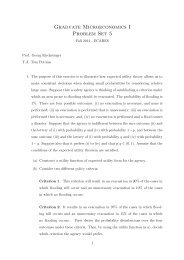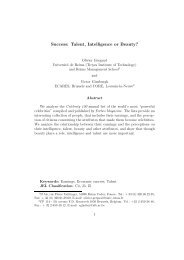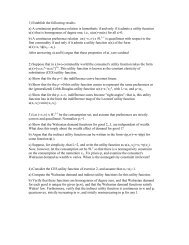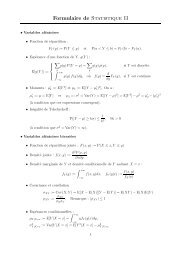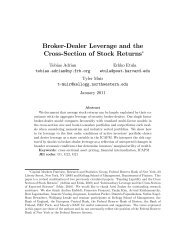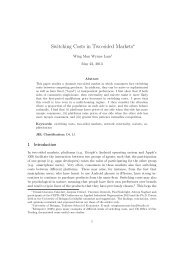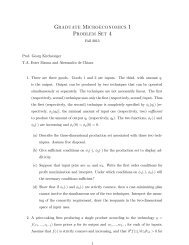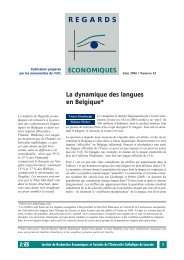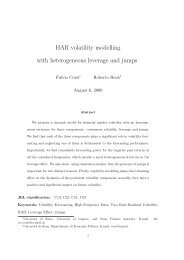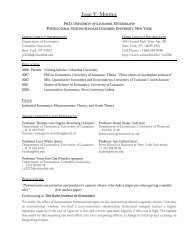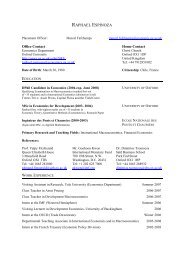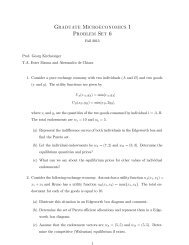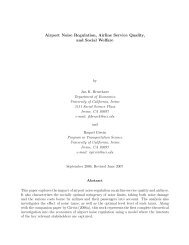Lecture 5. Choice under Uncertainty II - Ecares
Lecture 5. Choice under Uncertainty II - Ecares
Lecture 5. Choice under Uncertainty II - Ecares
Create successful ePaper yourself
Turn your PDF publications into a flip-book with our unique Google optimized e-Paper software.
<strong>Lecture</strong> <strong>5.</strong> <strong>Choice</strong> <strong>under</strong> <strong>Uncertainty</strong> <strong>II</strong><br />
1. Stochastic Dominance<br />
Comparison of payo¤ distributions<br />
First order stochastic dominance - two equivalent de…nitions:<br />
i) F (.) …rst-order stochastically dominates F 0 (.) if for every nondecreasing<br />
function u : R ! R it holds:<br />
Z<br />
Z<br />
u(x)dF (x) u(x)dF 0 (x)<br />
”Every expected utility maximizer who appreciates money prefers F (.)<br />
over F 0 (.)."<br />
() September 24, 2012 1 / 8
ii) F (.) …rst-order stochastically dominates F 0 (.) if<br />
F (x) F 0 (x) for all x.<br />
”The probability, that the realized payo¤ is above a certain threshold x, is<br />
larger for F (.) than for F 0 (.) for any such threshold.”<br />
Second order stochastic dominance:<br />
For any two distributions F (.) and F 0 (.) with the same mean, F (.)<br />
second-order stochastically dominates F 0 (.) if for every nondecreasing<br />
concave function u : R ! R it holds:<br />
Z<br />
Z<br />
u(x)dF (x) u(x)dF 0 (x)<br />
"Provided that both distributions give the same expected monetary payo¤,<br />
every risk averse agent prefers F (.) over F 0 (.)."<br />
() September 24, 2012 2 / 8
2. State dependent utility<br />
Agent cares not only about consequences, but also about reasons for<br />
consequences.<br />
S : set of states of nature, …nite; actual state unknown<br />
π s > 0 : probability that s occurs; objective probabilities<br />
Function g : S ! R + maps states of nature into monetary outcomes.<br />
Every g(.) induces a lottery F (.) with F (x) =<br />
∑ π s<br />
fs:g (s)x g<br />
Each g also represented by (x 1 ...x S ). Set of (nonnegative) g is R S +<br />
() September 24, 2012 3 / 8
: rational preferences de…ned on R S +<br />
De…nition: has an extended expected utility representation i¤ for every<br />
s 2 S there is a function u s : R + ! R such that: (x 1 ...x S ) (x1 0...x S 0 ) if<br />
and only if ∑ π s u s (x s ) ∑ π s u s (xs 0 ).<br />
s2S<br />
s2S<br />
u s: state dependent utility function (before: state-independent or state<br />
uniform utility functions)<br />
Furthermore, we allow that within each state the monetary payo¤ is not a<br />
certain amount, but a lottery with distribution F s (.).<br />
Hence, alternative L = (F 1 , F 2 ....F S ).<br />
() September 24, 2012 4 / 8
Extended independence: satis…es the extended independence axiom if<br />
for all L, L 0 , L" and α 2 (0, 1), we have:<br />
L L 0 i¤ αL + (1 α)L" αL 0 + (1 α)L"<br />
Proposition: Suppose is rational, continuous and satis…es the extended<br />
independence axiom. Then we can assign utility functions u s (.) for money<br />
in every state s such that for any L = (F 1 , F 2 ...F S ) and L 0 = (F 0 1 , F 0 2 ...F 0 S )<br />
we have:<br />
Z<br />
∑ π s (<br />
s2S<br />
L L 0 i¤<br />
Z<br />
u s (x s )dF s (x s )) ∑ π s (<br />
s2S<br />
u s (x s )dF 0<br />
s (x s )).<br />
() September 24, 2012 5 / 8
3. Subjective Probability Theory<br />
Till now: objective probabilities<br />
Now: no objective probabilities - uncertainty<br />
Goal: Derivation of subjective probabilities from preferences<br />
”The agent has preferences over the uncertain alternatives as if he<br />
maximizes an expected utility function with a probability distribution that<br />
looks like... ”<br />
S: set of states without objective probabilities<br />
g again represented by (x 1 ...x S ). Set of (nonnegative) g is R S +<br />
() September 24, 2012 6 / 8
Again we allow that within each state the monetary payo¤ is not a certain<br />
amount, but a lottery with distribution F s (.).<br />
Hence, again alternative L = (F 1 , F 2 ....F S )<br />
state dependent preferences = ( 1 , 2 , ... S )<br />
Preferences are assumed to be rational, continuous, and satisfy the<br />
extended independence axiom. Then we have u s (.) functions that are<br />
Bernoulli functions for every state.<br />
De…nition: The state preferences ( 1 , 2 , ... S ) are state uniform i¤<br />
s = s 0for all s, s 0 2 S.<br />
"The risk attitude towards money is the same in all states."<br />
() September 24, 2012 7 / 8
Proposition: Suppose is rational, continuous, satis…es the extended<br />
independence axiom, and is state uniform. Then there are probabilities<br />
(π 1 , π 2 ...π S ) >> 0 and a Bernoulli function u(.) on amounts of money<br />
such that for any (x 1 ...x S ) and(x1 0...x S 0 ) we have:<br />
∑<br />
s<br />
(x 1 ...x s ) (x1...x 0 s 0 ) if and only if<br />
π s u(x s ) ∑ π s u(xs 0 ).<br />
s<br />
Moreover, the probabilities are uniquely determined, and the utility<br />
function is unique up to a scalar transformation.<br />
() September 24, 2012 8 / 8



